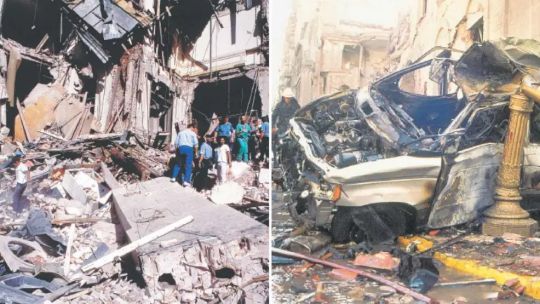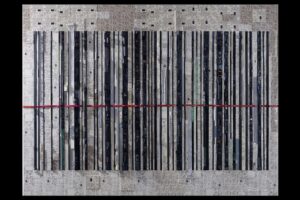
The ruling of federal judge Daniel Rafecas to apply a trial in absentia in the case of the terrorist attack against the AMIA Jewish community centre (July 18, 1994) opens up a door of hope against impunity after yesterday’s 31st anniversary of the crime. The Nuremberg Trials were one of the biggest precedents preparing the ground for the application of trials in absentia in Argentina being approved early this year on February 20. The two first cases are to be the military dictatorship and the AMIA attack.
The first presentation of Law 27,784 (Chapter V, Trial in absentia) was made, among others, by Mario Averbuch and Luis Czyzewski, the fathers of Yanina and Paola, slaughtered at the respective ages of 20 and 21 in the AMIA bombing. Averbuch and Czyzewski have been working towards passage of this legislation for almost a decade.
“Together with the judge Franco Fiumara and a few others we pushed what today we have as a law at public and parliamentary level. As from 2017 we began to communicate the possibility of advancing with the trial of those indicted who do not recognise Argentine jurisdiction. The first lawsuit where the judge was are all about,” adds the doctor.
“Both the materially guilty and those accused of treason and covering up will be judged,” says the plaintiff Mario Averbuch, the father of Yanina Muriel. For him, the trial is not only a crucial step for the truth denied and silenced for decades finally to emerge but also an act of memory and dignity for his daughter, to whom he says: “I have lived with my heart broken but my head held high because I honour you by not giving up.”
His motor in not letting up in his quest for justice is love and he is sure that he will get there: “When there is impunity, the wounds do not scar but going for the truth is indispensable and it is inexorable that it emerge – nobody will be able to stop it. No pact of impunity can halt it because one great truth can shatter 1,000 lies.”
OTHER TRIALS IN ABSENTIA:
THE DICTATORSHIP AND THE ISRAELI EMBASSY
Fugitives identified in the cases of the 1976-83 military dictatorship could also be tried in absentia – indeed, the first application in Argentina could be the chaplain Franco Reverberi Boschi, who took refuge in Italy and will be extradited to be tried in Argentina for crimes against humanity committed in Mendoza during the dictatorship.
It should be recalled that in 1990 Alfredo Astiz was convicted in absentia in France for the abduction, torture and disappearance in Argentina of the French nuns Alice Domon y Léonie Duquet. Note how it has taken Argentina 35 years to apply trials in absentia to cases under our noses.
“Another possible application could be in the recently reopened case of the 1976 attack on the Federal Police canteen by the Montoneros if it is declared a crime against humanity and if the accused do not present themselves,” continues Dr Fiumara.
And how about the 1992 attack on the Israeli Embassy in Argentina?
“If the prosecutor has identified the authors, that too,” responds the doctor. The application in this case should further contemplate it being declared a crime against humanity, as established for the AMIA case in 2005.
JURISPRUDENCE: FAMOUS CASES OF TRIALS IN ABSENTIA
One of the best-known cases is the Nazi Martin Bormann, who was tried in absentia between 1945 and 1946 in Nuremberg due to the lack of proof of his death. In the event of his still being alive, he was sentenced to death.
If trials in absentia are presented late, they should give the court a valid reason why they were unable to be presented in the past, for example, for having been abducted or detained, as happened with one of the accused for the Paris attacks of 1995.
Another country with an exemplary system of trials in absentia is Ukraine. Last April the former Ukrainian president Viktor Yanukovych was convicted in absentia for crossing over illegally to Russia in 2014 (the year of the annexation of the Crimea) after demonstrations against him which began for his decision to reject cooperation with the European Union and, in contrast, draw closer to Moscow.
Trials in absentia are also implemented in cases where an alliance with other countries is lacking.
“This is a complex issue because requests for extraditions come into play. There are countries whose constitutions or laws do not permit them to extradite their nationals but they offer to try them if sent copies of the cases and the evidence. Brazil, for example, proceeds to try them,” explains Fiumara.
Even Argentina, with its omissions and pardons, has been an obstacle for our own justice. Last year the Inter-American Court of Human Rights condemned Argentina for not having complied with its duty to investigate the AMIA case, finding it guilty of having placed obstacles in the path of the right to justice and insisting on the removal of “all obstacles, de facto and de jure, maintaining impunity in this case” while asking for the “investigations necessary to identify, try and, where the case applies, to sanction those responsible for the facts of this and establish the truth of what happened to be started, continued, pushed and/or reopened, all within a reasonable period of time.”
Reasonable within the possible even if 31 years since the attack were marked yesterday.
related news





